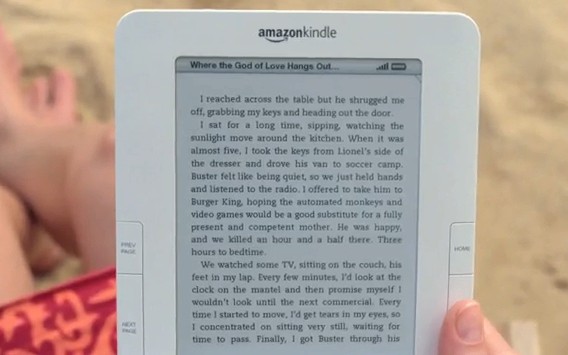
“The Kindle is wonderful for drunk people…” argues author Elif Batuman. “Before I first acquired a Kindle, exactly one year ago, I didn’t usually buy books while under the influence of alcohol…”
I laughed out loud at her funny stories about the life of a Kindle owner, which was published Saturday in a British newspaper. (Though according to Wikipedia, she teaches in America at Stanford University in California, where she spent seven years studying linguistics and comparative literature.) A little wine lowers her inhibitions, and soon she’s slumming with the Agatha Christie novels she’d loved as a child. “…although the detectives, Miss Marple and Hercule Poirot, were twinkly, grandparental types, nevertheless, everywhere these gentle souls went, someone was killed in hatred.”
“Because I am a writer, people sometimes ask me how ebooks have changed the literary landscape. The short answer, for me, is that I have developed a compulsion to drunk-dial Agatha Christie several times a week.”
This article inspired me to investigate Amazon’s Kindle store, where I discovered they’re currently offering a complete Agatha Christie mystery novel as a free ebook. Thanks to Kindle blogger Mike Cane, who discovered this article (adding “This is absolutely hilarious! Don’t drink and eBook, kids!”) Her funny observations were the perfect way to start Monday morning, and I think I’ll always remember Elif’s advice — that the Hercule Poirot mysteries are “perfect for a drunk reader with a decreased attention span.” And she hints at how easy it is to splurge on the purchases of ebooks — especially since, unlike a real-life book-buying binge, there’s “no physical book to reproach me the morning after!”
But for all the jokes, I think she really appreciates the joy of being able to curl up and read with a good ebook. “…at the end of the day, when I uncorked a $7 bottle of Viognier and turned on the Kindle, a wave of well-being washed over me.”
It’s funny, because in April this Kindle-loving author had also published a long book about studying the great Russian novelists. (She’d named her book after a Dostoyevsky novel — The Possessed — giving it the subtitle “Adventures with Russian Books and the People Who Read Them.”) I’d thought that was going to be a more scholarly work, but it turns out it’s a book filled with more terrific personal anecdotes, which also gradually explain how she came to love Russian novels. One reviewer called her “A Comedian in the Academy,” asking “Who knew studying Russian literature could be so funny?”
It’s a wonderful book — and yes, it’s also available on the Kindle. Though Elif Batuman is 23, she uses her smarts to weaves together her life experiences with all the things that she’s learned in her studies. She remembers the unpredictable Russian violin teacher she’d had as a teenager, and riffs on the “multitude of sad adventures” that’s cryptically promised to a character in “Eugene Onegin” (in a strange manual of dream intrepretation). She remembers being a freshman loving a senior (who’d once lived behind the Iron Curtain) — which somehow leads her to a summer job teaching English in Hungary. And then there’s a surreal experience at a children’s summer camp, when all the gym teachers suddenly approach her.
“The American girl will judge the leg contest!” they announced. I was still hoping that I had misunderstood them, even as German techno music was turned on and all the boys in the camp, ages eight to fourteen, were paraded out behind a screen that hid their bodies from the waist up; identifying numbers had been pinned to their shorts. I was given a clipboard with a form on which to rate their legs on a scale from one to ten. Gripped by panic, I stared at the clipboard. Nothing in either my life experience or my studies had prepared me to judge an adolescent boys’ leg contest…”
NPR published a small excerpt from this section, though it’s also available in the book’s free sample on the Kindle.
But click here if you’d rather try reading a free Agatha Christie mystery novel ebook while drunk!
